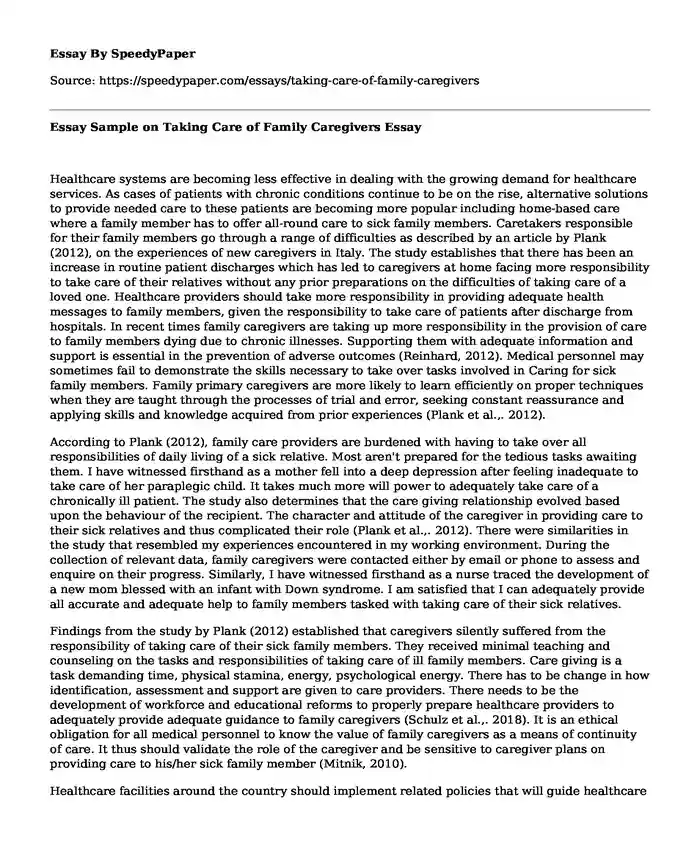
| Type of paper: | Essay |
| Categories: | Knowledge Family Special education Human services |
| Pages: | 3 |
| Wordcount: | 808 words |
Healthcare systems are becoming less effective in dealing with the growing demand for healthcare services. As cases of patients with chronic conditions continue to be on the rise, alternative solutions to provide needed care to these patients are becoming more popular including home-based care where a family member has to offer all-round care to sick family members. Caretakers responsible for their family members go through a range of difficulties as described by an article by Plank (2012), on the experiences of new caregivers in Italy. The study establishes that there has been an increase in routine patient discharges which has led to caregivers at home facing more responsibility to take care of their relatives without any prior preparations on the difficulties of taking care of a loved one. Healthcare providers should take more responsibility in providing adequate health messages to family members, given the responsibility to take care of patients after discharge from hospitals. In recent times family caregivers are taking up more responsibility in the provision of care to family members dying due to chronic illnesses. Supporting them with adequate information and support is essential in the prevention of adverse outcomes (Reinhard, 2012). Medical personnel may sometimes fail to demonstrate the skills necessary to take over tasks involved in Caring for sick family members. Family primary caregivers are more likely to learn efficiently on proper techniques when they are taught through the processes of trial and error, seeking constant reassurance and applying skills and knowledge acquired from prior experiences (Plank et al.,. 2012).
According to Plank (2012), family care providers are burdened with having to take over all responsibilities of daily living of a sick relative. Most aren't prepared for the tedious tasks awaiting them. I have witnessed firsthand as a mother fell into a deep depression after feeling inadequate to take care of her paraplegic child. It takes much more will power to adequately take care of a chronically ill patient. The study also determines that the care giving relationship evolved based upon the behaviour of the recipient. The character and attitude of the caregiver in providing care to their sick relatives and thus complicated their role (Plank et al.,. 2012). There were similarities in the study that resembled my experiences encountered in my working environment. During the collection of relevant data, family caregivers were contacted either by email or phone to assess and enquire on their progress. Similarly, I have witnessed firsthand as a nurse traced the development of a new mom blessed with an infant with Down syndrome. I am satisfied that I can adequately provide all accurate and adequate help to family members tasked with taking care of their sick relatives.
Findings from the study by Plank (2012) established that caregivers silently suffered from the responsibility of taking care of their sick family members. They received minimal teaching and counseling on the tasks and responsibilities of taking care of ill family members. Care giving is a task demanding time, physical stamina, energy, psychological energy. There has to be change in how identification, assessment and support are given to care providers. There needs to be the development of workforce and educational reforms to properly prepare healthcare providers to adequately provide adequate guidance to family caregivers (Schulz et al.,. 2018). It is an ethical obligation for all medical personnel to know the value of family caregivers as a means of continuity of care. It thus should validate the role of the caregiver and be sensitive to caregiver plans on providing care to his/her sick family member (Mitnik, 2010).
Healthcare facilities around the country should implement related policies that will guide healthcare workers on the appropriate steps to take when handing over the care of a sick patient to a family member (Salmond & Echevarria, 2017). Healthcare providers should provide psychological and emotional support, provide demonstrations on the tasks needed to be accomplished and then follow up on both the caregiver and the patient. According to Angelina, team collaboration between healthcare providers in the provision of information to the caregivers since they are the primary caregiver as this study has been established through different trials.
References
Schulz, R., Beach, S. R., Friedman, E. M., Martsolf, G. R., Rodakowski, J., & James III, A. E. (2018). Changing structures and processes to support family caregivers of seriously ill patients. Journal of palliative medicine, 21(S2), S-36.
Mitnick, S., Leffler, C., Hood, V. L., & American College of Physicians Ethics, Professionalism and Human Rights Committee. (2010). Family caregivers, patients and physicians: ethical guidance to optimize relationships. Journal of general internal medicine, 25(3), 255-260.
Reinhard, S. C., Levine, C., & Samis, S. (2012). Home alone: Family caregivers providing complex chronic care.
Plank, A., Mazzoni, V., & Cavada, L. (2012). Becoming a caregiver: new family carers' experience during the transition from hospital to home. Journal of clinical nursing, 21(13-14), 2072-2082.
Salmond, S. W., & Echevarria, M. (2017). Healthcare transformation and changing roles for nursing. Orthopedic nursing, 36(1), 12.
Cite this page
Essay Sample on Taking Care of Family Caregivers. (2023, Apr 23). Retrieved from https://speedypaper.net/essays/taking-care-of-family-caregivers
Request Removal
If you are the original author of this essay and no longer wish to have it published on the SpeedyPaper website, please click below to request its removal:
- Personal Experience Essay on the Most Difficult Academic Problem
- Literary Essay Sample on Behind the Beautiful Forevers by Katherine Boo
- Interview with an Elderly Person - Paper Example
- Peter Dahlgren, "Mediating Democracy". Free Essay Example
- Free Essay Example: What is Free Trade?
- Essay Example on Social Welfare and Policy
- Paper Sample: Impact of Covid-19 on Global Trade
Popular categories




